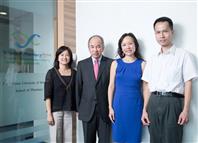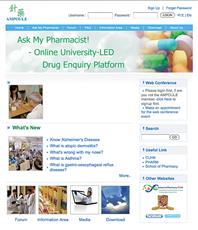Anatomy of an Academic Programme
The transmission of knowledge, the stimulation of thought, the promotion of research, and the creation of new knowledge are the core missions of universities as seats of higher learning. And, of all these mandates, the transmission of knowledge ranks as the most important, and the academic programme is its vehicle.
The year 2012 marks the 20th anniversary of the School of Pharmacy, which was established in 1992 as the first government-funded pharmacy school in Hong Kong. Over the last two decades, the school has provided excellent education to pharmacy students in Hong Kong, conducted research that is at the forefront of drug development and therapy, and contributed to the improvement in standards of the practice in Hong Kong.
Ideal Graduates
To date, the school has educated over 500 pharmacists, accounting for about one-third of the pharmacist workforce in Hong Kong. A school’s vision of its graduates is usually an important factor shaping its academic curriculum. What types of pharmacists-to-be does the school aim at producing? Prof. Vincent H.L. Lee, director of the school, said, ‘Ones who can shape the pharmacy profession in the best interest of the patient. At CUHK, we train our graduates for a rewarding career in any health care setting: community, hospital, even settings that do not yet exist today. Above all, we expect our graduates to work actively and collaboratively in the health care community to assure affordable, efficacious, and safe medicine for all.’
Programme Evolvement
The First Decade
Compared to pharmacy schools in the US and the UK, the school, at least for most of the time up until this year, had only three years for preparing graduate pharmacists to practise in Hong Kong. Dr. Susan Ho, associate director of pharmacy education, related a bit of history. ‘Twenty years ago, the first curriculum of the then department was drawn up by a working group formed under the Faculty of Medicine. The group consulted the curricula of the UK, the US and Australia. Teaching staff were recruited from overseas. Workshops were then organized to seek the input of local practitioners and pharmaceutical leaders to finalize a curriculum that was aligned with the needs of Hong Kong.’
The Second Decade
While the first decade was spent on foundation building, it was in the second, at the turn of the century, that the Department of Pharmacy became the School of Pharmacy, and the undergraduate programme was revamped. There were more professional courses as well as experiential-type learning; students were given on-the-site training and research experience.
People Not Pills
Prof. Vivian Lee, associate professor, believes the aim of the curriculum is to bring about the ‘3Ps’. First is ‘proactive’—students should reach out. ‘Seven years ago, we launched an elderly community outreach programme which takes students outside the classroom to help people in the community. The programme is currently funded by the I·Care Programme.’ Second is ‘participation’. ‘We want students to engage in the community and render patient-centred care. About 60 to 70% of the elderly are not compliant with the drug-taking regimen because of the complexity of the regimen or the drugs’ side-effects; while 25 to 30% can’t read drug labels because they’re illiterate. It’s the role of pharmacists to motivate and explain to them, and make sure they take their meds properly.’ The third ‘P’ refers to ‘promotion’. ‘We’d like our students to promote the image of pharmacists as not only experts in drugs, but also caring health care providers and promoters of primary health care.’
Another way of promoting is through technological innovation. In 2009, with the help of her students, Prof. Vivian Lee launched the first interactive online drug information platform in Hong Kong—AMPOULE or Ask My Pharmacist! Online University-Led Drug Enquiry Platform. Though quite a mouthful, AMPOULE provides relevant drug-related information for the layman and addressing enquiries from the public in Hong Kong, Europe, Asia and the Middle East. It also helps to promote the image of pharmacists as caring health care professionals.
World Trends
What are some of global trends that have helped to shape pharmacy education? ‘Outcome-based approach to learning,’ said Dr. Susan Ho. ‘We are one of the pioneers who adopted that approach 10 years ago. And also an emphasis on good communication skills as pharmacists no longer just stay in the dispensary.’ Prof. Vivian Lee believes that as patients increasingly take an active role in seeking drug information rather than simply obeying doctor’s instructions, pharmacists need to be trained to address questions that patients may pose. ‘Professionalism is an attitude we foster in all our students throughout their study period at CUHK. At the heart of this is ethics, honesty, integrity, accountability, and respect for others,’ was Prof. Vincent Lee’s reply.
Global Exposure and China Links
The school has student exchange agreements with leading American and British institutions. Two years ago, it launched its first link with mainland China, specifically, with Jinan University in Guangzhou. Its sister institutions now include the University of Southern California, University of California at San Francisco, University College London, Sun Yat-sen University, and Fudan University. The school also conducts training in mainland China, and collaborates with organizations there, including Fudan University and Sun Yat-sen University, to hold workshops, seminars and conferences. In July, the school co-organized with the Chinese Pharmaceutical Association the Asian Conference in Clinical Pharmacy. That was the most successful in the history of the conference, with some 1,000 delegates from 23 countries in attendance.
Professionalism and Dedication
Prof. Kenneth To, who belonged to the third batch of our BPharm graduates, was also a graduate from our PhD programme. He subsequently pursued postdoctoral training in cancer research at the National Cancer Institute in the US, and was recruited to join the school at his alma mater in 2008. Professor To was most appreciative of his education at the University. ‘The pharmacy curriculum at CUHK was well-rounded and it exposed me to every aspect of pharmacy—patient care, clinical service, pharmaceutical science research... everything.’
‘I am proud of our school’s stellar record of attracting academically high achievers year after year for more than two decades.’ said Prof. Vincent Lee. ‘I am also proud of the excellent effort of our staff in challenging these students with a rigorous curriculum that meets international standards. Our postgraduate students made me proud by their dedication to cutting-edge research in pharmaceutical sciences, by their success in securing international awards and prizes, and by their excellent teamwork in establishing the first student chapter of the American Association of Pharmaceutical Sciences in China. At the School of Pharmacy, students come first and the sky is the limit.’
Given its comprehensive curriculum, dedicated teachers, talented students, and solid links, it is no surprise that the school has performed exceedingly well in programme evaluations by the University. ‘Our signature final year graduation projects have consistently impressed external examiners from overseas. A recent examiner commented that these projects were as sophisticated as the Master’s level projects in the US,’ reported Prof. Vincent Lee. With the increase in enrolment brought about by the reversion to a four-year normative curriculum and by the increase in annual student intake from 30 to 55, the school is planning to offer more electives to expand the intellectual and professional horizons of its students.
Do you have what it takes to be a pharmacist?
When interviewing students for the programme, the school looks for certain qualities. ‘The applicants have to be well-grounded and disciplined. They should be effective communicators who have the passion and heart to serve the sick and the disadvantaged. As active and team-based learning grows in importance, we are mindful of the need to consider diversity, sharing, and leadership in rendering admission decisions,’ observed Prof. Vincent Lee, director of the School of Pharmacy. For Dr. Susan Ho, the potential to be good teachers, multitaskers, and having good time management skills are important. 





































































































































































Social Bookmarks